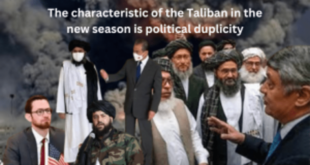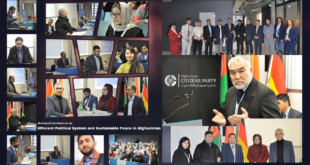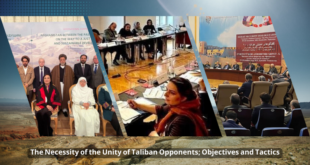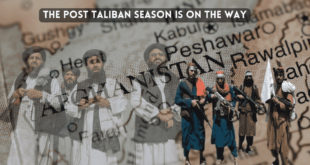The political history of Afghanistan has been marked by a series of power struggles that have led to the loss of stability and sustainable political order in past centuries. The country has struggled to establish an efficient and accountable political system, resulting in the formation of failed political systems that have played a significant role in their own collapse. Instead of being a source of stability and security, the political system in Afghanistan has been a primary factor in unrest and instability. The failure of political systems in Afghanistan has resulted in social turmoil within the country and placed a burden on the global community.
The continuous crisis in Afghanistan can be attributed to various factors, with the nature of political systems in the country being one of the most significant. Throughout its history, Afghanistan has experienced various forms of government, including the semi-constitutional monarchy of Amanullah, the constitutional monarchy of the 1960s, the Republic of Daoud Khan, the People’s Democratic Republic, the Islamic government, the Islamic Emirate, and the centralized Islamic Republic government from 2000 to 2021. However, none of these political systems have been able to establish a stable and effective governance. Thus, while the country’s political history is marked by a series of different political systems, none has succeeded in creating a stable and efficient political order, from the semi-constitutional monarchy of Amanullah to the centralized Islamic Republic in 2000.
The unexpected collapse of the republic and the renewed rule of the Taliban terrorist group have deepened the crisis in Afghanistan more than ever before. Here, there are two potential paths for the future of Afghanistan: the continuation of past mistakes, which poses a threat to the country and the world, or learning from past failures and addressing historical gaps and shortages by exploring possible solutions. This solution cannot be achieved solely by waiting for change; rather, it requires the thoughtful consideration of scholars and policymakers in the political arena.
The Afghan Citizens’ Party deemed it necessary to engage in dialogue with pundit in the political arena to formulate an effective strategy for the political system. Through this process, the party concluded that the current political deadlock necessitates an international conference to discuss the type of political system required in the country. This conference should involve the participation of all political and ethnic factions, as well as domestic and international experts, free from political pressures and ethnic or religious biases, to seek suitable solutions for the current conditions in the country.
To this end, the one-day conference on “Efficient Political System and Sustainable Peace in Afghanistan” was hosted by the Afghan Citizens’ Party in collaboration with the University of Dusseldorf in Germany. The conference received positive reception from intellectuals and was held on December 9th with the maximum participation of invited guests from various countries. The conference was organized into four scholarly sessions that logically examined and comprehensively discussed the systematization from its fundamental layers, addressing various aspects related to the political system.
opening ceremony
The opening ceremony of the conference on an efficient political system and sustainable peace in Afghanistan began at 9:30 in the morning with the recitation of the Holy Quran by Mr. Alizadeh. Subsequently, the national anthem of the country was played, and then Mr. Shirmohammad Entezar, an active member of the Cultural Committee of the Citizens’ Party and the Master of International Relations, introduced the four sessions as the general executive of the conference.
The opening speech of the conference was delivered by Dr. Ershad, a professor at the University of Bucharest and the head of the Citizens’ Party of Afghanistan. The head of the Citizens’ Party, in the beginning, expressed gratitude for the presence of political and cultural elites, supporters of the Citizens’ Party of Afghanistan, and all the guests present at the session. He explained the necessity of holding the conference and stated that, to overcome the current situation, theoretically, three assumptions could exist: a system based on the use of force and individual or national dictatorship, a system based on deception and deceit of others, and a system based on the rights of individuals and citizens of Afghanistan.
He emphasized that sustainable peace comes into existence when the third type of system is prioritized in the political agenda of Afghan society. This political system is based on the latest theories of justice and is oriented towards fairness, which can guide us towards sustainable peace.
Session One: The Origin and Foundation of the Political System
The first theme of the speeches encompassed the discussion of examining the origin and nature of the political system, with a focus on the religious and secular nature of the system. The exploration of popular and modern legitimacies in comparison to traditional legitimacies constituted another topic in this section of the conference. Dr. Mohammad Hossein Kholosi the head of the Cultural Committee of the party, served as the academic secretary of the first session. He identified the differences between two types of legitimacy based on citizenship rights and legitimacy based on religious and tribal aristocracy. Based on this framework, he invited experts in this field to present their speeches.
Dr. Mohammad Nazif Shahranji, a professor at Indiana University in the United States, was the first speaker of this session. He mentioned ethnocentrism, the lack of accountability, and an instrumental approach to power as significant societal issues in Afghanistan and emphasized the importance of cultural and political reform to overcome the current situation. Professor Shahranji explained that incorrect political culture has led to the destruction of Afghanistan. He identified four types of political cultures, including individualism, authoritarianism, religious orientation, and political dependency, as contributors to the country’s decay and destruction.
He added that to move beyond the crisis of systematization, Afghanistan needs to shift from individualism to value orientation, transforming the people’s status from subjects to citizens. Shahranji highlighted the necessity of cultural and political transformation for the country to move forward.
Dr. Andisheh, the ambassador of Afghanistan in Geneva, was the second speaker of this session, inviting attendees to pay attention to the tangible realities of society and emphasizing the pragmatic dimensions of systemization. Dr. Andisheh characterized the current governance as monopolistic and illegitimate, highlighting the most significant reality of the country as the lack of legitimacy in the political system. Dr. Andisheh explained his pragmatic approach, stating that the architects of the past shape the future.
Mrs. Anarkaili Hunaryar, was the third speaker in this session. She reviewed the challenging situation of women in Afghan society, emphasizing that her experiences as a woman and as a religious minority reflect various constraints in Afghanistan that have existed even before the Taliban era. Another focal point of Mrs. Anarkaili’s remarks was political cohesion, which has gained heightened importance in the current situation. Avoiding division and preserving national unity are crucial for achieving larger goals.
The last speaker in the first session was Dr. Mohammad Javad Salehi, who reviewed the process of achieving sustainable peace in the modern era. In his remarks, he considered rationality and scientism crucial in attaining peace and emphasized, “Just as building industries such as airplanes, cars, and missiles is not possible without knowledge, system-building is also impossible without experimental knowledge.” Salehi explicitly regarded secularism as important in system-building and pointed out that the interference of religion in the political sphere leads to the misuse of religion, making an efficient political system and sustainable peace unattainable. Drawing on the experience of medieval Europe, Dr. Salehi condemned the interference of religion and the clerical establishment in the political arena as destructive
Session Two: Background and identical Examples (Positive or Negative) of Political System and Sustainable Peace.
Dr. Mohammad Bagher Zaki, a researcher at the University of Freiburg in Germany and a member of the Central Council of the Citizens’ Party, chaired the scientific session. In this session, Ms. Shokoria Barkazi delivered a speech. Ms. Barkazi expressed gratitude to the organizers of the session and explained the current situation in Afghanistan.
Professor Faiz Mohammad Jalal was another speaker in this section who, with a critical approach, reviewed the historical past of political systems. Professor Jalal explained that the most significant reason for the failure of specific political systems is the monopolistic nature of these systems. He clarified that this monopolistic tendency is not exclusive to a particular ethnicity but that other ethnicities and groups have also been entirely loyal to this monopoly in governance. He further continued that the title of a national hero should not be exclusive to one individual; instead, Afghanistan, like some neighboring countries, can have multiple national heroes from all ethnicities in the country.
The last speaker in this section was General Reza Amini, a member of the Central Council of the Citizens’ Party. Drawing on his own experiences and based on the policies of past systems, General Amini spoke briefly about the crises of system-building in the historical context, especially during the republican era.
Session Three: The Nature of the Political System and Sustainable Peace.
In the third session, Dr. Akbari, a member of the Central Council of the Citizens’ Party of Afghanistan, chaired the session. In this session, short and recorded speeches by two foreign guests were broadcast. Dr. Michael Rubin, a senior fellow at the Enterprise Institute in the United States, expressed that the Taliban are not the future of Afghanistan, and the future of Afghanistan belongs to all the people of this country. All the people of Afghanistan, from all ethnic groups, should play a role in the future of Afghanistan. Mr. Nicholas Kay, former British ambassador to Afghanistan, welcomed the holding of the conference. He emphasized that for the construction of Afghanistan, all ethnicities in Afghanistan and their differences should be respected. He added that he supports all political movements that work towards building such an Afghanistan.
Another speaker in this session was Dr. Masoud Tarshtwal, a university professor and a researcher on peace and conflict in Afghanistan. Dr. Tarshtwal emphasized the indigenous model of conflict resolution in Afghanistan and highlighted the importance of localizing conflict resolution solutions. Mr. Tarshtwal added that Afghanistan is facing a crisis of legitimacy, and national dialogue can serve as a solution to end conflicts in Afghanistan and move beyond this problem.
Another speaker in this session was Dr. Najafi, who spoke based on his experiences during the era of the communist government. Najafi pointed out that international governments in the Loya Jirga era supported the constitutional parliamentary system, but the spectrum of tribalism opposed and rejected the power of this type of system in Afghanistan. As a result, they withdrew from the Loya Jirga’s agenda. Najafi emphasized widespread approaches and avoiding ethnic and religious biases.
Session Four: The Structure of the Political System and Sustainable Peace in Afghanistan.In this session, the most serious discussion of the day was about the political system. The first speaker in this section was Dr. Abbas Baser, the former Minister of Higher Education of Afghanistan. Dr. Baser explained that federalism, as a political system, can address the problems of Afghanistan. According to Mr. Baser, centralized structures in Afghanistan do not provide solutions. Mr. Baser added that when talking about a centralized or decentralized system, everyone agrees that a decentralized system can be proposed as a political system for the future of Afghanistan. He noted that the Islamic Unity Party declared federalism as a solution to system-building in Afghanistan in the early 1970s for this purpose.
Professor Turdikhel Mimanegi was another speaker in this section, emphasizing comprehensive decentralization in Afghan society. He pointed out that the level of suppression and authoritarianism in Afghanistan is such that political decentralization alone cannot be a solution. Cultural and identity decentralization, similar to political decentralization, is crucial. He spoke from his experience as an Uzbek, stating that ethnic identity and the Uzbek language have always been suppressed. Professor Mimnegi found the rejection of federalism by some ethnicities puzzling and unacceptable, emphasizing that if federalism is considered properly and in line with the existing realities, it can be a suitable solution for system-building in Afghanistan. He added that if the ethnic groups of Afghanistan do not take steps to solve their problems, they will not escape the current situation. According to him, since tribalism took the place of modern governance, Afghanistan has not experienced a day without war.
Dr. Shafiq Shafaq was another speaker in this session who discussed the strategy of combating discrimination and avoiding ethnicity and localism. He emphasized that in the fight against discrimination and ethnicity, it is necessary for everyone to first free themselves from ethnicity and localism. Professor Shafiq emphasized national cohesion, which is achieved through equality and respect for differences.
The last speaker in this section was Haji Alizadeh from the United States, who emphasized the necessity of scholarly dialogues and called for the establishment of representation for the Citizens’ Party in the United States.
summarized
Dr. Mazhar Khawari, a professor at the University of Dortmund in Germany and a member of the Central Council of the Citizens’ Party, summarized the discussions at the end. He noted that the presentations, especially the dialogues between speakers and participants, although showing aspects of frustration, indicate a broad reception and the presentation of various ideas about the political system. Hope and cohesion are essential components of the future, and from the series of speeches, power decentralization is also considered important.
Resolution
The final resolution was read by Mr. Owhadi during the conference, and this resolution, consisting of eleven clauses, has been formulated to emphasize the legitimacy of the popular system, the non-recognition of the current situation, and the rejection of any system based on domination. It also underscores the international community’s attention to the status of women
In this resolution, it is stated that a political system is not a sacred entity to be imposed on society through romantic and ideological perspectives. A political system is designed as a rational construct for the collective intelligence of societies to respond to their needs and may vary with different historical conditions. The efficiency of such a system is also highlighted in the resolution: an efficient political system is one that, in principle, is based on citizenship principles, social justice, freedom and equality, tolerance, and the rule of law. Structurally, it is non-centralized, recognizes power as rotational, and is based on election mechanisms. An efficient political system is one where the fundamental rights of the people are respected, regardless of national, religious, gender, or other issues. The political system is obliged to ensure these rights, and ultimately, an efficient political system is one in which decision-making power in the system is distributed both horizontally and vertically, with decision-making competence distributed at all levels
The conference concluded with a collective group photo taken in the end
Cultural Committee of the Citizens’ Party of Afghanistan
 حزب شهروندان افغانستان وبسایت رسمی حزب شهروندان افغانستان
حزب شهروندان افغانستان وبسایت رسمی حزب شهروندان افغانستان



